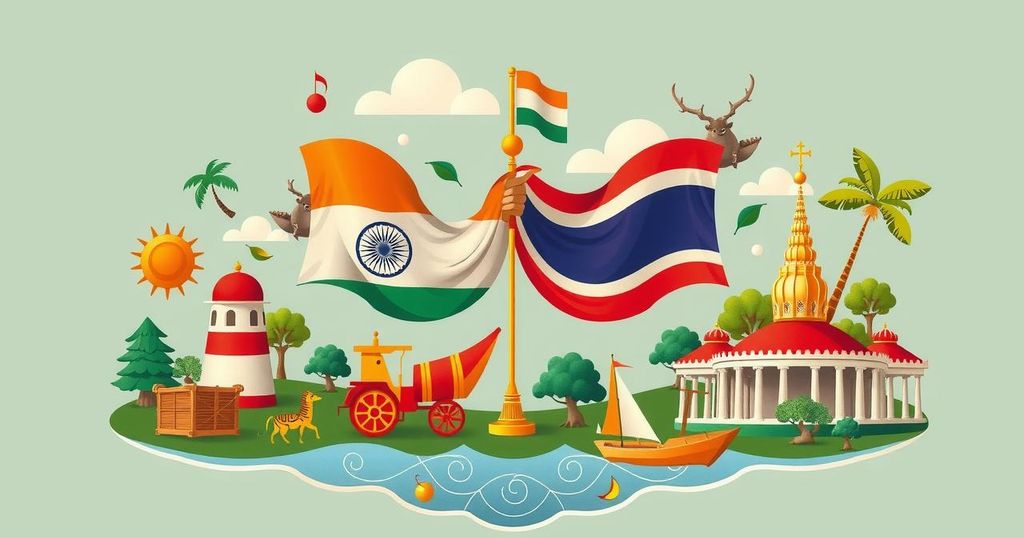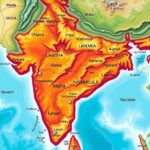Politics
ASEAN, ASIA, ASSOCIATION OF SOUTHEAST ASIAN NATIONS, BANGKOK, BI, BILATERAL COOPERATION, BILATERAL RELATIONS, CHINA, DELHI, DIPLOMACY, ECONOMIC COOPERATION, INDIA, INDO - PACIFIC, JAISHANKAR, MEXICO, MODI, MYANMAR, NARENDRA MODI, NEW DELHI, NORTH AMERICA, PACIFIC, PAETONGTARN SHINAWATRA, SHINAWA, STRATEGIC PARTNERSHIP, THAILAND
Omar El-Sharif
India and Thailand Enhance Ties to Strategic Partnership
India and Thailand upgraded their relations to a strategic partnership, focusing on enhancing trade, defense, and security cooperation. Prime Ministers Modi and Shinawatra discussed key areas including cyber-crime prevention, human trafficking, and cultural ties on the eve of the Bimstec Summit. The partnership reflects India’s commitment to ASEAN unity amidst growing regional tensions with China.
On March 28, 2023, the leaders of India and Thailand, Prime Minister Narendra Modi and Prime Minister Paetongtarn Shinawatra, convened in Bangkok to elevate their bilateral relations to a strategic partnership, prior to the Bimstec Summit. The partnership aims to enhance trade, investment, and cooperation in areas such as defense, security, and cyber-crime prevention. This meeting underscores Thailand’s importance as a key partner within the framework of India’s “Act East” policy.
Prime Minister Modi expressed India’s condolences regarding the recent earthquake affecting Myanmar and Thailand during a joint media session with Prime Minister Shinawatra. He stated, “Thailand has a special place in India’s ‘Act East’ policy and our Indo-Pacific vision. Today we have decided to give our relations the form of a strategic partnership”. Additionally, discussions focused on creating a strategic dialogue among security agencies of both nations.
While addressing concerns regarding China, Modi affirmed India’s commitment to ASEAN unity and a free, open, and rules-based order in the Indo-Pacific. He asserted, “We believe in the policy of development, not expansionism,” indicating a clear stance against China’s aggressive practices in the region. Modi also highlighted the complementary nature of India’s and Thailand’s policies, fostering bilateral cooperation.
In the realm of security, Modi noted collaboration on various strategic issues including defense, security, and maritime safety. He emphasized the vital relationship between their security agencies in combatting human trafficking, highlighted by Thailand’s recent involvement in the repatriation of Indian citizens victimized by cyber-crime syndicates. The leaders also affirmed their commitment to working together against terrorism and money laundering.
Cultural, educational, and tourism cooperation was also discussed, particularly promoting exchanges between Thailand and India’s northeastern states. Modi announced initiatives to enhance trade, investment, and business collaborations, while introducing free e-visas for Thai tourists to encourage people-to-people interactions. Two-way trade reached $16 billion in 2023, with Thailand recognized as India’s fourth-largest trading partner in the ASEAN region.
The nations signed a joint declaration to establish the strategic partnership along with several memorandums of understanding, including cooperation in digital technologies and support for micro, small, and medium enterprises. The partners also committed to several developmental agreements relating to India’s northeastern states.
Highlighting cultural connections, Modi praised the historical exchanges between India and Thailand, especially regarding the Ramayana’s influence on Thai culture. He noted the significant number of visitors to Buddhist relics sent from India to Thailand, further strengthening cultural ties. In a gesture of goodwill, Thailand issued a commemorative stamp celebrating these historical connections during Modi’s visit.
The recent elevation of India-Thailand relations to a strategic partnership marks a significant step in enhancing cooperation across trade, security, and cultural domains. Both leaders emphasized the mutual benefits from increased collaboration, particularly in defense, counter-terrorism efforts, and regional stability. This partnership not only strengthens the bilateral ties but also reinforces their combined stance in the broader Indo-Pacific context, addressing shared interests and challenges.
Original Source: www.hindustantimes.com








Post Comment